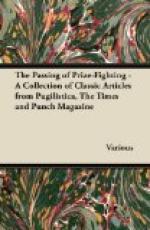IX.
PENNYROYAL.—A CAROL.
"Far away in Sicily!”—
A home-come sailor sang this
rhyme,
Deep in an ingle, mug on knee,
At Christmas time.
In Sicily, as I was told,
The children take them Pennyroyal,
The same as lurks on hill and wold
In Cotsall soil.
The Pennyroyal of grace divine
In little cradles they do
weave—
Little cradles therewith they line
On Christmas Eve.
And there, as midnight bells awake
The Day of Birth, as they
do tell,
All into bud the small plants break
With sweetest smell.
All into bud that very hour;
And pure and clean, as they
do say,
The Pennyroyal’s full in flower
On Christmas Day.
Far away in Sicily!—
Hark, the Christmas bells
do chime!
So blossom love in thee and me
This Christmas time!
W.B.
* * * * *
[Illustration: Lady (to uniformed friend). “I SHOULDN’T A BIT MIND WEARING UNIFORM IF ONLY ONE COULD CHOOSE ONE’S OWN COLOURS AT THE WAR OFFICE.”]
* * * * *
THE V.C.
My cousin Agatha has been a bad correspondent ever since she married my old friend, George Thimblewell, which means for the past five-and-twenty years, so in ordinary circumstances I do not expect more from her than a “hasty line” to tell me how the youngsters are doing (George, of course, never writes at all). But I must say I was surprised and not a little hurt when, in the skimpy margin of a letter dealing mainly with the difficulty of devising breakfast-dishes, she scribbled in the most casual manner conceivable, “George has got the V.C. at last.”
George, my dear old school-chum, with the V.C., and his wife tells me of it as casually as if it had been a gumboil! I sat with her letter before me and looked back through the years, seeing us two—George and myself—as we were long before Agatha even knew him. Had I not fostered the yearning for heroic deeds in his young bosom? Was it not possible, nay probable, that the influence of his boyhood’s companion had helped to mould his character and prepare it for this glorious if belated achievement? Upon my word it seemed to me that I myself might well take a certain amount of credit for that decoration. And here was his wife mentioning it as though she scarcely expected me to be interested. Never a date, never a detail.
I was so ruffled that I decided, since she vouchsafed no information, to ask for none, as became a man with proper pride. I adopted a semi-jocular vein to meet the case.
“I have known your V.C. longer than you have, Agatha,” I wrote, “and am as pleased and proud as you can be. The strong silent type—you can rely upon them. Quiet and domesticated, requiring little attention, helpful about the house, undemonstrative perhaps, but all the time ready for the most desperate emergency. Let me know when George is to be at home, and I shall come to dinner and hear all about it.”




